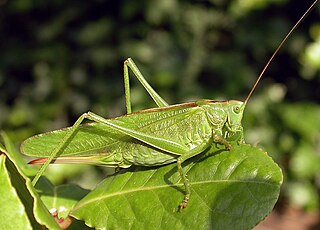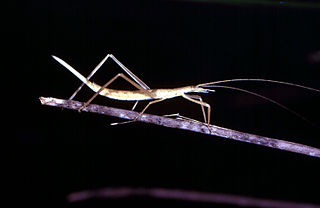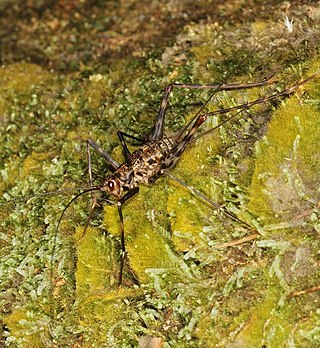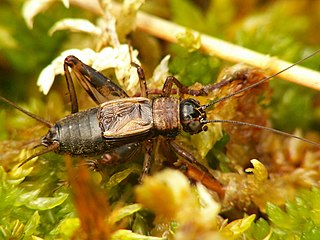
Anostostomatidae is a family of insects in the order Orthoptera, widely distributed in the southern hemisphere. It is named Mimnermidae or Henicidae in some taxonomies, and common names include king crickets in Australia and South Africa, and wētā in New Zealand. Prominent members include the Parktown prawn of South Africa, and the giant wētā of New Zealand.

Cooloola is a genus of ensiferan orthopterans known as Cooloola monsters. It is the only genus in the subfamily Cooloolinae and family Cooloolidae of the superfamily Stenopelmatoidea.

The Tettigoniinae are a subfamily of bush crickets or katydids, which contains hundreds of species in about twelve tribes.

The Phasmatidae are a family of the stick insects. They belong to the superfamily Anareolatae of suborder Verophasmatodea.

Kawanaphila is a genus of insects in family Tettigoniidae from Australia. It was described in 1993 by David C. Rentz.
Phasmodes, known as stick katydids, is a genus of Australian insects in the family Tettigoniidae and the only genus within the subfamily Phasmodinae.
Throscodectes is a genus of Australian bush crickets.

Zaprochilus, the twig-mimicking katydids, is a genus of bush crickets or katydids in the subfamily Zaprochilinae. They are found in Australia.

Phalangopsinae, occasionally known as spider crickets, are a subfamily of crickets in the family Phalangopsidae. Members of Phalangopsinae are found worldwide in tropical and subtropical regions. Most species in the subfamily are nocturnal and can be found in rocky areas, near fallen wood, and the understory of forests. Some species are gregarious, gathering in large numbers.

Tympanophora is a genus of bush-crickets, known as balloon-winged katydids, found in Australia. It is the only extant (living) genus in the subfamily Tympanophorinae.

Gryllacridinae is an Orthopteran subfamily in the family Gryllacrididae.

Nemobiinae is a subfamily of the newly constituted Trigonidiidae, one of the cricket families. The type genus is Nemobius, which includes the wood cricket, but members of this subfamily may also be known as ground crickets or "pygmy field crickets".

Conocephalinae, meaning "conical head", is an Orthopteran subfamily in the family Tettigoniidae.

Agraeciini is a large tribe of bush crickets or katydids in the conehead subfamily, Conocephalinae.
Microtettigonia is a genus of bush-crickets or katydids, endemic to Western Australia and known as micro katydids. It is the only genus of the subfamily Microtettigoniinae.

Zaprochilinae is a subfamily of bush-crickets found in Australia; the type genus is Zaprochilus.

Austrosaginae, the sluggish katydids, are a subfamily of Australian insects within the family Tettigoniidae.

The Listroscelidinae are a subfamily of the Tettigoniidae found in the Americas, Madagascar, and Australia. The genus Arachnoscelis has become better known to the public after being featured on the cover of Science in 2012.

Tettigoniidea is an infraorder of the order Orthoptera, with six extant families.

Hyperbaeninae is a subfamily of Orthopterans, sometimes known as 'leaf-folding crickets' in the family Gryllacrididae; Hyperbaenus ensifer is the type species. The known distribution includes tropical: central and southern America, Africa and mainland Asia to Australasia.

















